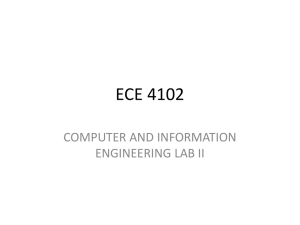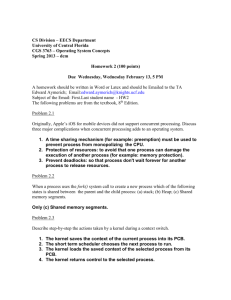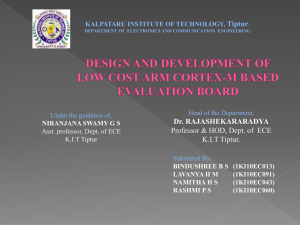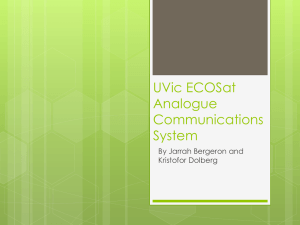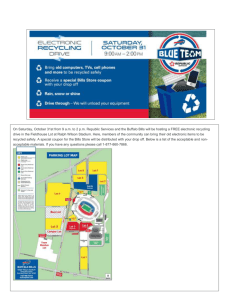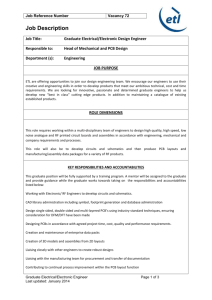TERMS OF REFERENCE DUTY STATION: Home
advertisement
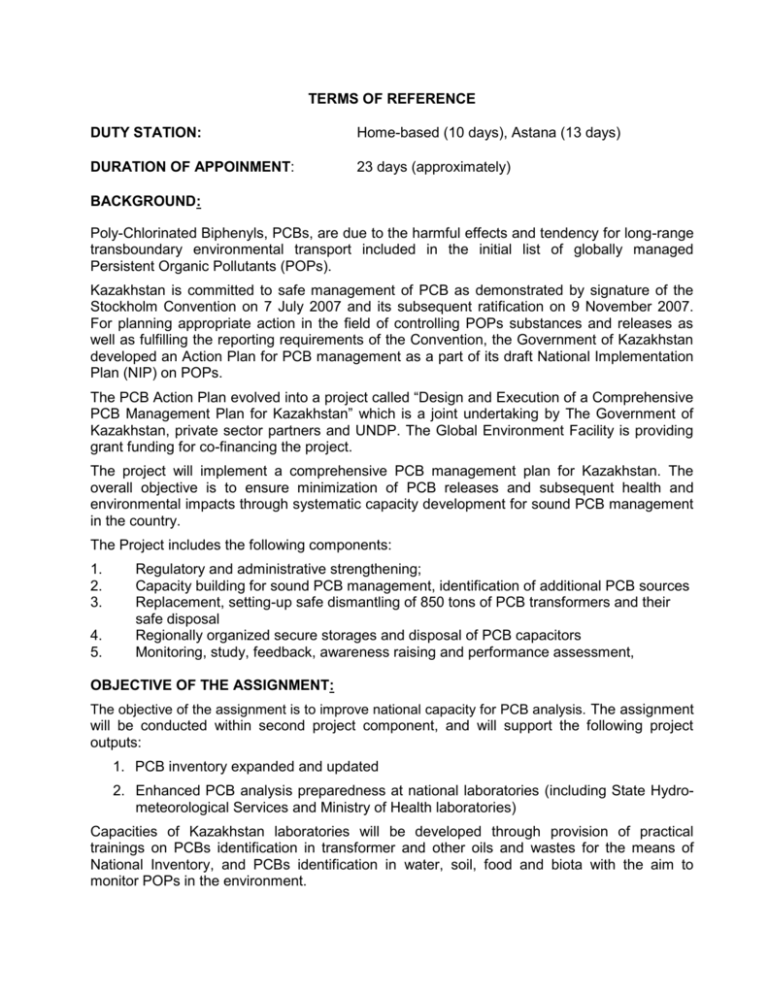
TERMS OF REFERENCE DUTY STATION: Home-based (10 days), Astana (13 days) DURATION OF APPOINMENT: 23 days (approximately) BACKGROUND: Poly-Chlorinated Biphenyls, PCBs, are due to the harmful effects and tendency for long-range transboundary environmental transport included in the initial list of globally managed Persistent Organic Pollutants (POPs). Kazakhstan is committed to safe management of PCB as demonstrated by signature of the Stockholm Convention on 7 July 2007 and its subsequent ratification on 9 November 2007. For planning appropriate action in the field of controlling POPs substances and releases as well as fulfilling the reporting requirements of the Convention, the Government of Kazakhstan developed an Action Plan for PCB management as a part of its draft National Implementation Plan (NIP) on POPs. The PCB Action Plan evolved into a project called “Design and Execution of a Comprehensive PCB Management Plan for Kazakhstan” which is a joint undertaking by The Government of Kazakhstan, private sector partners and UNDP. The Global Environment Facility is providing grant funding for co-financing the project. The project will implement a comprehensive PCB management plan for Kazakhstan. The overall objective is to ensure minimization of PCB releases and subsequent health and environmental impacts through systematic capacity development for sound PCB management in the country. The Project includes the following components: 1. 2. 3. 4. 5. Regulatory and administrative strengthening; Capacity building for sound PCB management, identification of additional PCB sources Replacement, setting-up safe dismantling of 850 tons of PCB transformers and their safe disposal Regionally organized secure storages and disposal of PCB capacitors Monitoring, study, feedback, awareness raising and performance assessment, OBJECTIVE OF THE ASSIGNMENT: The objective of the assignment is to improve national capacity for PCB analysis. The assignment will be conducted within second project component, and will support the following project outputs: 1. PCB inventory expanded and updated 2. Enhanced PCB analysis preparedness at national laboratories (including State Hydrometeorological Services and Ministry of Health laboratories) Capacities of Kazakhstan laboratories will be developed through provision of practical trainings on PCBs identification in transformer and other oils and wastes for the means of National Inventory, and PCBs identification in water, soil, food and biota with the aim to monitor POPs in the environment. INSTITUTIONAL FRAMEWORK: In 2007 Kazakhstan ratified the Stockholm Convention on POPs and pursuant to the Article 11 the country is obliged to monitor POPs in the environment. The Republic’s main environmental monitoring responsible authority is Kazhydromet of the Ministry of Environment Protection. Currently Kazhydromet monitors the list of principal pollutants in the air, surface and ground waters, soils, population centers. Conditions of agricultural lands are monitored by the Phytosanitary Inspection of the Ministry of Agriculture. The quality of drinking water and food is controlled by the Committee for Hygiene and Epidemiologic Control of the Ministry of Health. The quality of food imported from foreign countries is controlled by the Customs Control Committee of the Ministry of Finance. However, virtually no agency controls any persistent organic pollutants, except for DDT, the analysis of which are performed only occasionally in response to special requests. Also, being a party of the Stockholm Convention, Kazakhstan is obliged to identify and liquidate all of the present PCBs in the country by 2028. The new legislation on handling of POPs and POPs containing wastes places an obligation on all enterprises to carry the Inventory of their equipment based on the analytical laboratory results to identify all of the PCB equipment present in the country. For these means there is a strong necessity in training of the relevant analytical laboratories in the use of POPs analysis methods. FIELDS OF RESPONSIBILITY: The selected contractor is expected to develop the training modules for PCB analysis in various media as well as to provide practical trainings and workshops on the implementation of developed training modules. The Assignment will consist of two groups of activities: Group 1: Preparatory activities Communication with UNDP country office in Kazakhstan and the GEF/UNDP PCB Management project; - Development and finalization of a detailed work plan (timing and execution of deliverables); - Review of analysis methods for PCBs in various media and development of two training modules; Group 2: Delivery of two training modules: - - - Training 1 (3 days): Sample preparation and analysis in water, soil, biota, foods for PCB and other POPs presence using a gas chromatograph and mass spectrometer; the contractor will train the laboratory staff of the Ministry of Health Training 2 (5 days): Sample preparation and analysis in transformer oil for PCB identification using a gas chromatograph and mass spectrometer; the contractor will train the laboratory staff of the Ministry of Environment Protection, other interested state bodies and also private laboratories. 1 Rev Apr 2013 Preparations are expected to commence in-house and include preparation of training modules. Trainers will arrive to Kazakhstan to deliver workshops on sample preparation and analysis using a gas chromatograph and mass spectrometer for the laboratory staff of Ministry of Environment Protection, Ministry of Health and private laboratories. The trainings will be supported by the UNDP/GEF PCB Management project, which will be responsible for all practicalities of the trainings (venue, translation, invitations, etc.). The contractor is, however, fully responsible for the development of the training modules, and for the conducting of these. The contractor will be supported by two national experts in the arrangement and conduction of the trainings. The local experts will support the contractor in setting up contacts with local laboratories and in analyzing the current status of laboratory capacities and functional areas of various laboratories. The local team will also provide the Standard Operating Procedures (SOP) developed by the previous training contractors for identification of PCBs in insulating liquids and food; the contractor has the right to use available SOPs in preparation of the training modules or to develop separate ones. EXPECTED OUTCOMES AND PAYMENTS: Time of services (reports) to be provided № Expected outcomes 1 Finalization of a detailed work plan, including draft training programme July 2013 2 day, home-based : Sample preparation of transformer oil, water, soil, biota, foods for PCB; and analysis using a gas chromatograph and mass spectrometer (4 presentations, handout August 2013 6 days, home-based Payment 20% (in July 2013) Preparation of training materials on 2 30% (in August 2013) materials for workshop participants – 20 pages). Delivery of the 2 trainings in Astana September 2013 13 days in Astana 3 Short final report on the works conducted September 2013 2 days home-based 50% (in September 2013) PARTICIPANTS: The Contractor will train the laboratory staff of Ministry of Environment Protection, Ministry of Health, and also private laboratories to sample and determine PCB in transformer oil and oilcontaining wastes, soil, water. 1. Laboratories of the Ministry of Environment Protection: 2 Rev Apr 2013 - laboratories of the Ecological Department: 4 people; - laboratories of Kazhydromet RSE: 4 people; 2. Laboratories of the Ministry of Health: - laboratories of the Committee for State Hygiene and Epidemiologic Control: 16 people. 3. Private laboratories: 10 people. MISSION DATES AND LOCATION: Location: Astana. July-September (13 days, 2 practical trainings) DELIVERABLES: Submission of the following documents is expected: 1. Finalized workplan 2. Draft training module 3. Finalized training module: Sample preparation of transformer oil, water, soil, biota, foods for PCB; and analysis using a gas chromatograph and mass spectrometer; the contractor will train the laboratory staff of Ministry of Environment Protection, Ministry of Health, and also private laboratories to sample and determine PCB in transformer oil and oil-containing wastes, soil, water. 4. Short final report Finalized workplan The workplan will be developed in close consultation with UNDP Kazakhstan and the UNDP/GEF PCB Management Project. The workplan shall follow the above schedule on outputs and payments, but shall provide more detail. Training modules and preparation of training materials The training module should be based on the most suitable analytical methods for determination of POPs in transformer oil, water, soil, biota and foods, discussed and confirmed with the project. The contractor can use the Standard Operating Procedures for Determination of Polychlorinated Biphenyls (PCBs) in Insulating Fluids and in Food by Capillary Gas Chromatography and with Electron Capture Detection available with the project, or develop separate guidelines and standard operation procedures for certain methods that will be used in the trainings. Training Module 1: Sample preparation of transformer oil for PCB analysis; and analysis using a gas chromatograph and mass spectrometer Training Module 2: Sample preparation of foods for PCB analisis; and analysis using a gas chromatograph and mass spectrometer 3 Rev Apr 2013 Both training modules shall be based on: i. review of analytical methods on POPs in EU, US and CIS ii. sample preparation and analysis using a gas chromatograph and mass spectrometer; iii. practical work on gas chromatograph The workshop materials shall consist of a minimum of six presentations and any other handout materials for workshop participants, with a minimum of 20 pages per presentation. The training modules must fully develop a workshop’s theme, with a special focus on accuracy of sample preparation and analysis procedure. Apart from the theoretical knowledge, training modules should include practical lessons (at least 50% from the total time) at equipment provided by the project partners and using real samples (samples can be provided by the project or contractor). Short final report on work conducted (and a PowerPoint presentation on the findings) The finalized report should contain the description of methods of sample analysis for PCB and other POPs presence, laboratory equipment, sample preparation and analyses procedures, results processing and reporting. All materials must be submitted in soft copy. The full copyright of the files shall be with the national implementing partner. QUALIFICATION REQUIREMENTS TO A COMPANY: 1) 2) A bidder should be a legal entity; A bidder should be creditworthy, not subject to liquidation, its property should not be under arrest, its financial and economic activity should not be suspended according to the legislation of a bidding country; 3) Five years of experience in training and delivery, organization of working meetings/workshops; 4) Five years of experience in Assignment’s thematic areas (including those related to environment pollutants, environmental monitoring and also environmental planning and management); 5) Previous experience in project implementation in CIS countries is an advantage; 6) Track record consisting of at least 3 projects implemented in the field of a required thematic area; 7) Good English communication skills (writing and speaking); ability to speak Russian is an advantage; 8) Experience in interacting with all stakeholders: ecological laboratories, non-governmental organizations and a private sector, ministries, municipal associations, local governments etc.; 9) Company staff should have a higher vocational education in the field of chemistry and laboratory research; 10) References from former clients are an advantage. 4 Rev Apr 2013
